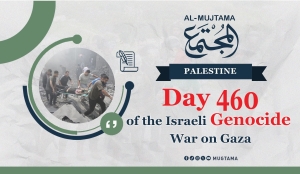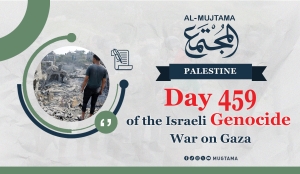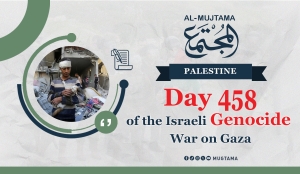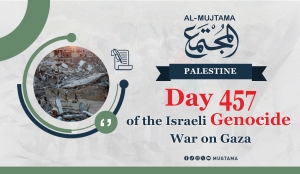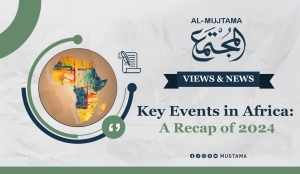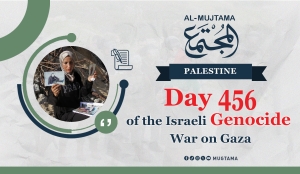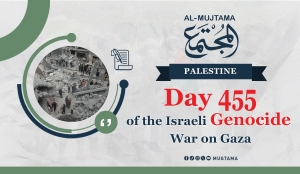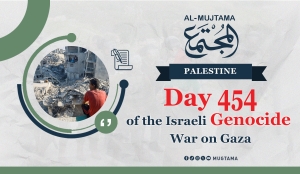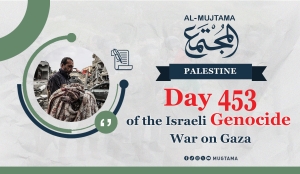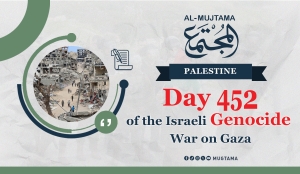Admin Mugtama
Developments on the 460th day of the genocide on Gaza
January 08, 2025The war in "Israel" and the crime of genocide being carried out by the occupying forces against Palestinian families, civilians, and displaced people in the Gaza Strip entered its 460th consecutive day today, Wednesday, coinciding with ongoing bombings and targeting of inhabited homes, and the commission of new massacres.
The toll from the continuous Israeli military aggression on the Gaza Strip since October 7, 2023, has risen to 45,885 martyrs, in addition to 109,196 injured with varying degrees of wounds, some of which are critical.
For the 96th day, the occupation army continues its military operation in northern Gaza through airstrikes, artillery shelling, destroying homes, and enforcing a policy of starvation and blockade.
On Tuesday, the Ministry of Health warned of a real disaster besetting hospitals, oxygen stations, medicine refrigerators, and incubators in all remaining health facilities operating in the sector due to fuel shortages.
Medical sources reported the martyrdom of 49 Palestinians from yesterday morning until midnight tonight (Tuesday/Wednesday) in various areas of the Strip.
Latest Developments
Early Wednesday, three citizens were martyred due to the bombing of the al-Banna family's house in Deir al-Balah city, including Ahmad Nabil al-Banna, 17 years old, Hudaifa Nabil al-Banna, 22 years old, and Wahba Muhammad Salman al-Banna (al-Hajj), 48 years old.
Five martyrs and several injuries arrived early today at the Baptist Hospital after targeting the "Barghout" family's house near Bilal Mosque in the al-Zeitoun neighborhood in southern Gaza City.
Israeli war boats opened fire west of al-Nuseirat in the middle of the Gaza Strip.
The occupation aircraft also launched an Israeli airstrike on an apartment in Deir al-Balah city early today.
The occupation army demolished residential buildings in the al-Nazla area of Jabalia in northern Gaza.
Several citizens were martyred and injured in an Israeli air raid targeting a house in al-Bureij camp in the central Gaza Strip.
Seventeen citizens were martyred last night, Tuesday, due to the Israeli bombardment on Khan Younis city in southern Gaza, including 8 children and 5 women.
Among the martyrs identified after the occupation's bombing of the Muhaireb family home in Khan Younis camp were Rahaf Muhammad Zakaria Muhaireb, Wissam Nadi Zakaria Muhaireb, and Wissam Iyad Abdul Halim Al-Qazzaz.
459 Days of Genocide: Ongoing Israeli Massacres in Gaza and Casualties Among Occupation Forces
January 07, 2025The occupation forces have continued their aggression against the Gaza Strip by land, sea, and air since October 7, 2023, resulting in the martyrdom of 45,854 citizens, the majority of whom are women and children, and the injury of 109,139 others, while thousands of victims remain trapped under the rubble of destroyed homes.
The Israeli occupation forces continue their aggression on the Gaza Strip on the 459th day of the genocide, causing more casualties, most of whom are children and women.
The Palestinian news agency reported the martyrdom of citizens and the injury of others due to the bombing of the occupation’s aircraft on the home of the Al-Obaid family near the Ain Jalout towers, south of Al-Nuseirat, in the central Gaza Strip. It was added that four citizens were martyred after the occupation’s aircraft targeted the home of the Sawahil family on Hamid Street in the Al-Shati refugee camp in the west of Gaza Province.
Journalistic sources reported injuries to a number of citizens due to the bombing of the occupation’s aircraft on a tent for displaced persons belonging to the Ismail family near the entrance to Al-Maghazi in the central Gaza Strip.
Israeli warplanes targeted a house belonging to the Abdul Hadi family in the Al-Bureij camp in the central sector last night, resulting in the martyrdom of four citizens, including children, and the injury of 13 others with varying degrees of wounds, according to the Al-Awda Hospital in Al-Nuseirat.
Earlier today, a citizen was martyred by the fire of an Israeli drone, a "quad copter," which targeted him in the Al-Maqousi area in the northwest of Gaza City.
Two children were also martyred this morning in the bombing of occupation warplanes in the town of Al-Shawka east of Rafah.
The United Nations Relief and Works Agency for Palestine Refugees in the Near East (UNRWA) announced an increase in child deaths in the Gaza Strip due to cold and lack of shelter to seven, amid the continued Israeli genocide against the sector.
UNRWA added in a statement issued tonight that “the cold weather and lack of shelter are causing the deaths of newborns in Gaza, while 7,700 newborns lack life-saving care.”
As of now, reports indicate “the deaths of at least seven children due to the cold in the sector.”
The statement pointed out that “the World Health Organization condemned the assaults by the Israeli army, which has rendered the Kamal Adwan Hospital in northern Gaza out of service.”
The UN agency reported that “it has been confirmed that Israel has carried out 50 attacks on Kamal Adwan Hospital and the surrounding areas since October 2024.”
The WHO also called for the release of the director of Kamal Adwan Hospital, Hussam Abu Safiya.
Displaced persons are living in tents made of cloth and nylon under harsh humanitarian conditions due to the shortage of essential life supplies such as water and food, as well as a severe lack of clothing, blankets, and heating supplies during the winter.
The occupation army admitted the killing of military personnel, one of whom is an officer with the rank of captain, and the injury of two others seriously in their battles with the Palestinian resistance in the northern Gaza Strip.
Al-Qassam Brigades fired a barrage of rockets from the town of Beit Hanoun toward "Sderot"; they also announced targeting “two Zionist 'Merkava' tanks with explosive devices east of the Safatawi junction, west of the Jabalia camp in the northern sector.”
The occupation forces continue their aggression by land, sea, and air against the Gaza Strip since October 7, 2023, resulting in the martyrdom of 45,854 citizens, the majority of whom are women and children, and the injury of 109,139 others, while thousands of victims remain trapped under the rubble of destroyed homes.
Rockets from Gaza Target Sderot… Killing 3 Settlers in the West Bank
January 06, 2025
As the 458th day of "The Flood of Al-Aqsa" operation begins, the occupation forces continue to escalate their aggression against the Gaza Strip, leaving behind massacres against civilians, amidst ongoing clashes between the Palestinian resistance and occupation forces on several fronts.
Three Settlers Killed and 10 Injured in Shooting Incident East of Qalqilya
Three settlers were killed and 10 others were injured this morning, Monday, in a shooting operation that targeted a vehicle and a bus carrying settlers near the village of Al-Funduq, east of Qalqilya in the occupied West Bank.
According to the Israeli emergency services (Magen David Adom), the toll from the operation stands at 3 dead and 6 injuries, one of which is reported to be critical, while other Hebrew sources reported an increase in the number of injured to 10.
The police of the occupation revealed the identity of one of the deceased, who is Sergeant Elad Yaakov Finkelstein, an investigator at the Ariel Settlement Police Station.
Hamas": Resistance Continues Despite Heightened Security Measures**
The Islamic Resistance Movement (Hamas) congratulated the heroic operation, describing it as a legitimate response to the ongoing crimes of the occupation in the Gaza Strip and the policies of forced displacement in the West Bank, in addition to the assaults by settlers and Temple Mount groups on Al-Aqsa Mosque.
The movement affirmed in a press statement today that this operation reflects the will of the resistance in the West Bank despite the strict security measures imposed by the occupation.
It stated that this operation sends a strong message to the extremist occupation government that the Palestinian people, in Gaza, the West Bank, and all of Palestine, will continue their resistance until the complete liberation of the land.
"Hamas" called for escalating resistance actions in all forms in the West Bank and within the occupied territories, with the aim of thwarting the occupation's plans and continuing to pressure it on all fronts.
Abu Ubaida: The Occupation Will Pay for Its Aggression
Abu Ubaida, spokesperson for the Izz ad-Din al-Qassam Brigades, confirmed in a post on his Telegram channel that the heroes of the West Bank are proving that they are an integral part of the "Flood of Al-Aqsa" battle, stressing that the occupation's attempts to break the will of resistance or isolate the West Bank from supporting Gaza will fail.
Abu Ubaida said: Once again, the brave fighters of the West Bank prove that they are at the heart of the "Flood of Al-Aqsa" battle, and all bets on breaking them or deterring them from supporting Gaza by the occupation and its agents are doomed to fail from the outset.
He added: The enemy must know that as long as it continues its massacres and aggression against Gaza and the West Bank, it will pay a heavy price in the blood of its soldiers and settlers, and it will not enjoy security until our people enjoy it.
Smotrich calls for genocide in Nablus and Jenin
In a serious escalation, the extremist Israeli Finance Minister Bezalel Smotrich called on Monday for carrying out acts of genocide and ethnic cleansing against the Palestinians in the cities of Nablus and Jenin in the northern occupied West Bank. These calls come in the context of ongoing incitement against the Palestinian people and the escalation of aggression.
Smotrich's statements came in response to a shooting operation in which three settlers were killed and seven others were wounded near the Kedumim settlement, located east of Qalqilya, where the minister himself lives. In his statement, Smotrich said: "The town of Bido, Nablus, and Jenin must be like Jabalia, so that Kfar Saba does not become like Kfar Gaza."
Rockets from Gaza target Sderot
On another front, Hebrew media reported that a rocket hit a building in the city of Sderot, within the Gaza envelope, causing material damage. Reports indicated that Israeli air defenses intercepted one rocket, while two others fell in the city.
The "Al Jazeera Net" site reported from "Channel 12" that the rockets were launched at Sderot from just hundreds of meters away from an Nahal Brigade site in Beit Hanoun in northern Gaza.
Escalating international legal pursuits against occupation soldiers
Recently, there has been a noticeable increase in attempts to pursue occupation soldiers legally abroad, with the "Israeli Broadcasting Authority" noting that around 50 complaints have been filed against reserve soldiers, and investigations have been opened in 10 countries, according to the Anadolu Agency.
Although there have been no recorded direct arrests, the cases are being dealt with individually, especially for dual nationals. Sources explained that some cases have seen urgent legal interventions, as happened with an Israeli soldier wanted in Brazil who managed to leave before being arrested on charges of war crimes in Gaza.
The occupation destroys 1000 mosques and the resistance eliminates 10 soldiers in Beit Lahia
January 05, 2025
As the 457th day of the "Al-Aqsa Flood" operation begins, the occupying forces continue to escalate their aggression against the Gaza Strip, leaving behind massacres against civilians, amid ongoing clashes between the Palestinian resistance and the occupation forces on several fronts.
88 martyrs and 208 injuries in one day
The Ministry of Health in Gaza announced that the occupying forces committed five new massacres in the past 24 hours, resulting in the deaths of 88 martyrs, while 208 others sustained varying injuries. The ministry confirmed that the total death toll from the Zionist aggression since the outbreak of the war on October 7, 2023, has risen to 45,805 martyrs, including thousands of women and children, in addition to 109,064 injuries. The figures indicate a systematic targeting of residential neighborhoods and families, reflecting the continued policy of collective punishment against unarmed civilians.
The occupation has destroyed nearly 1000 mosques in Gaza
The Palestinian Ministry of Awqaf and Religious Affairs revealed in a special report the extent of the destruction inflicted on places of worship in the Gaza Strip and the West Bank as a result of the Zionist aggression. The report stated that the occupation has completely destroyed approximately 1000 mosques and caused partial damage to 151 other mosques. Additionally, 19 cemeteries were completely destroyed, including desecration and excavation of graves at several sites. In the West Bank, settlers invaded Al-Aqsa Mosque more than 250 times during the past year, amid the complicity of occupation forces. In Hebron, the occupation prevented the call to prayer in the Ibrahimi Mosque 670 times, as part of its attempts to Judaize holy sites and empty them of Islamic life.
The Palestinian resistance engages with 10 soldiers in Beit Lahia
Al-Qassam Brigades and Al-Quds Brigades announced the execution of a joint operation in Beit Lahia, northern Gaza, where resistance fighters clashed with a walking Zionist force consisting of 10 soldiers, resulting in the death and injury of members of the force. In a military statement, Al-Qassam Brigades confirmed that the resistance fighters used light weapons and hand grenades, pursuing one of the fleeing soldiers and neutralizing him from point-blank range. This operation comes as part of new tactics implemented by the resistance to inflict heavy losses on the occupation in terms of lives and equipment, despite the Zionist military superiority.
A march in Michigan... calls to stop targeting hospitals in Gaza
In the American city of Detroit, dozens of health sector workers organized a protest march urging the U.S. Congress to take immediate action to stop the targeting of hospitals and health centers in Gaza, according to the Palestinian news agency. The march carried the slogan "Not another child, not another hospital," referring to the aggression that has claimed the lives of hundreds of patients and medical personnel and destroyed dozens of hospitals. Hundreds of health workers participated in signing a petition addressed to the American Academy of Pediatrics, demanding an end to the targeting of Palestinian doctors and nurses and condemning the assaults that turn hospitals into war zones, which violates all international treaties.
Zionist military flees Brazil after investigation order
A Brazilian court ordered an investigation into a visiting Zionist military personnel, following accusations of committing war crimes in Gaza, after a complaint was filed by an international organization based in Brussels. According to Hebrew media reports, the Zionist military managed to leave Brazil back to the Zionist entity before being investigated, reflecting the occupation's attempts to protect perpetrators of crimes and ensure their impunity from international punishment."
Key Events in Africa: A Recap of 2024
January 05, 2025
As the year ended, there arises a need to review the most significant events that Africa witnessed in 2024, which ranged from political transformations, cultural achievements, and sports successes to natural disasters. While some news from Africa brought joy, others carried sadness; however, the overall events did not differ much from those experienced in other parts of the world.
Summarizing the events of the year for a continent as vast as Africa poses a significant challenge, as the events included notable moments, such as the miraculous victory of the Ivory Coast national football team in the Africa Cup of Nations 2024, presidential elections that witnessed democratic changes, as well as an increase in natural disasters and the loss of prominent figures.
The Triumph of the "Elephants" in the Africa Cup of Nations 2024
One of the most significant sports events in Africa this year was the Africa Cup of Nations, held in Ivory Coast with the participation of 24 teams. The 34th edition of the tournament kicked off on January 13 and continued until February 11, 2024, when the Ivorian team was crowned champion after defeating Nigeria in an exciting final match.
This victory was described as miraculous, especially following the tough start for the Ivorian team, which barely qualified for the Round of 16, finishing third in its group and needing help from the Moroccan team to overcome Zambia in the final moments. With only three points from three matches, and after a crushing defeat by Equatorial Guinea (0-4), the Ivorian team unexpectedly returned to the competition.
Following this achievement, the Ivorian team decided to change its coaching staff, replacing French coach Jean-Louis Gasset with local interim coach Emeris Foe, who led the team to the title. The team overcame major challenges during the tournament, including defeating the reigning champion Senegal in the Round of 16, overcoming Mali in the quarterfinals, and beating the Democratic Republic of Congo in the semi-finals, culminating in a significant victory over Nigeria in the final match.
This achievement reflects the willpower and spirit of challenge of the Ivorian team, marking it as one of the most important sports milestones on the continent this year.
Africa's Struggles Between Droughts and Floods
Despite being one of the least contributing continents to greenhouse gas emissions, Africa remains the most vulnerable to the impacts of climate change. The year 2024 witnessed an unprecedented series of natural disasters, where hurricanes, floods, and droughts mixed with heavy rains and torrents to deeply affect the daily lives of many countries on the continent. The extreme El Niño phenomenon served as a multiplier for these devastating events.
The continent faced a series of major hurricanes, including Cyclone Bilal in Mauritius, and Cyclone Jaman in Madagascar, as well as Cyclone Hidayah which swept through Kenya and Tanzania. Flooding affected numerous countries, including the Democratic Republic of Congo, Niger, Mali, Sudan, Chad, Nigeria, and Cameroon. Meanwhile, Southern African countries, such as Zambia and Malawi, suffered from some of the worst droughts.
These disasters have caused severe human and material damage. According to the International Organization for Migration, the floods resulted in the deaths of more than 1,500 people in West and Central Africa. In Chad alone, one million people were affected by the floods, resulting in the deaths of 145 individuals, the destruction of 70,000 homes, and the loss of 30,000 head of livestock, in addition to damage to more than 250,000 hectares of agricultural land and crops.
Wide-ranging presidential elections and a changing democratic landscape
In 2024, Africa witnessed the organization of presidential elections in 14 countries, whether through direct or indirect voting, encompassing nations that represent about 25% of the continent's population. Although most presidents seeking re-election succeeded in doing so through questionable means, as happened in Algeria where it was announced that President Abdelmadjid Tebboune won with 84.30% of the votes after the electoral body had attributed 94.65% to him.
However, some countries were marked by unique democratic measures. In Botswana and Mauritius, the outgoing presidents were defeated by their opponents. Meanwhile, in Senegal and Ghana, where the constitution barred sitting presidents from running for a third term, their challengers won fair elections. Senegal and Ghana stand out as models of stable democracy in a region of West Africa experiencing a general decline in this area.
Among the 14 presidential elections held on the continent, four were characterized by democratic power transfer, which were in Senegal, Botswana, Mauritius, and Ghana. In Senegal, the elected president, Ousmane Sonko, emerged from prison to become the youngest president in the country’s history at the age of 44, winning 54.28% in the first round. He pledged to achieve radical change through policies based on transparency and integrity.
In another historic event, Namibia elected a woman as president for the first time, with Netumbo Nandi-Ndaitwah, the deputy leader of the ruling party, winning with 57.31% of the votes in the first round, reflecting an important step towards equality and the empowerment of women in political leadership.
World Cup 2030 in Morocco with Spain and Portugal
The Kingdom of Morocco, considered a leader in organizing African football, announced its participation in hosting the 2030 World Cup alongside Spain and Portugal, in celebration of the centenary of the tournament's inception. This decision came after the unanimous approval of the FIFA Congress at a meeting on Wednesday, December 11, 2024. All 211 member associations of FIFA endorsed the joint bid by acclamation.
With this decision, Morocco will become the second African country to host the tournament after South Africa in 2010. For the first time in World Cup history, matches will be held across three continents: Africa (Morocco), Europe (Spain and Portugal), in addition to the three opening matches that will take place in South America, honoring the first edition held in Uruguay in 1930 with the participation of Argentina, Chile, Paraguay, and Uruguay.
Morocco's victory came after previous attempts to host the tournament in 1994, 1998, 2006, 2010, and 2026. For the 2030 edition, which will feature 48 teams, Morocco has already chosen six cities to host the matches: Casablanca, Rabat, Marrakech, Fes, Agadir, and Tangier.
Prominent African figures who passed away in 2024:
- Amadou Makhtar Mbow (Senegal): He died between the night of September 23 and 24 in Dakar at the age of 103. The Senegalese thinker served as the Secretary-General of UNESCO for 13 years (1974-1987). He was a teacher and a minister during the presidency of Léopold Sédar Senghor, and he was known for his advocacy of cultural plurality.
- Issa Hayatou (Cameroon): He passed away on August 8, 2024. He is associated with African football, having chaired the African Football Confederation (CAF) from 1988 to 2017. He also served as the interim president of FIFA between 2015-2016 during the corruption crisis that led to the suspension of Sepp Blatter.
- Toumani Diabaté (Mali): He died on July 19, 2024, at the age of 58. Known as the "King of the Kora," he was one of the foremost players of the traditional 21-string kora instrument, belonging to a family of griots who preserve the musical heritage and traditions of West Africa.
- Hage Geingob (Namibia): He passed away on February 4, 2024, at the age of 82. He was one of the most prominent political figures in Namibia's history, leading the country's struggle against apartheid and for independence, eventually serving as Prime Minister before becoming the country's President.
- Among other notable figures who passed away: Hama Amado Fo (Nigeria), the veteran politician nicknamed "the Phoenix," who died at the age of 74; Breyten Breytenbach (South Africa), the writer and anti-apartheid activist, who died at the age of 74; John Okafor (Nigeria), the Nollywood star known as "Mr. Ibu," who died on March 2, 2024; and the Congolese basketball legend Dikembe Mutombo, a member of the NBA Hall of Fame, who died on September 30 at the age of 58.
-------------------------
Source: Analyses from the African Center for Research and Study of Policies (Afropolicy)
African Center for Research and Study of Policies
Resistance Launches Rockets from the Gaza and Broadcasts a Video of an Israeli Female Prisoner
January 04, 2025On the 456th day of aggression against Gaza, Israeli airstrikes on various areas of the Strip resulted in the deaths of 54 people since dawn on Saturday, 37 of whom were in the northern part of the Strip. Meanwhile, occupation forces targeted again elements tasked with securing aid in Khan Younis and Deir al-Balah, leading to the martyrdom of several of them.
Escalation of the aggression
Amid the escalation of the aggression, Israeli Knesset members called for the complete displacement of the residents of northern Gaza and the killing of those who do not carry a white flag.
A missile from the Strip
At the same time, the resistance launched a missile from the Strip towards the settlements surrounding Gaza. Israeli Channel 12 reported that the missile landed in an open area, while the Israeli army radio mentioned that Hamas had launched about 20 rockets from Gaza over the past nine days, including 14 rockets from northern Gaza.
A video of an Israeli female soldier
In a related context, the Izz ad-Din al-Qassam Brigades released a video of an Israeli female soldier who has been a prisoner in Gaza for more than 450 days, in which the prisoner attacked the Israeli government and army, asserting that they have abandoned the prisoners held by the resistance.
Targeting Palestinian displaced persons
The Israeli occupation army continued to target Palestinian displaced persons in their locations, resulting in more martyrs and injuries. As the 456th day of the ongoing genocide war commenced, the Palestinian Ministry of Health announced the perpetration of four new massacres against Palestinian families within 24 hours, resulting in the deaths of 59 martyrs and injuries to 273 others.
45,717 martyrs
The toll of the Israeli aggression on the Gaza Strip since the onset of the genocide war in October 2023 has risen to 45,717 martyrs, while the number of injured and wounded has escalated to 108,856. The Ministry of Health reported that a number of victims remain under the rubble, and rescue and civil defense teams cannot reach them on the roads.
Israeli airstrikes
Israeli airstrikes continued on various regions in the Gaza Strip, leading to the martyrdom of 28 individuals since dawn on Saturday, January 4, with 16 of them from the besieged northern Gaza.
In Gaza City, the civil defense reported the recovery of three martyrs, a man, his wife, and their son, from a home bombed by the Israeli occupation on Sahaba Street in the west of the city. The civil defense also confirmed the recovery of two injuries due to an Israeli bombing of a house on al-Nazzaz Street in al-Shuja'iyya, east of Gaza City, while 11 people remain trapped under the rubble.
Escalation in southern Gaza
In a related context, several individuals were injured due to the Israeli occupation bombing a school housing displaced persons in the al-Sabra neighborhood, south of Gaza City. This comes as the occupation escalated its targeting of areas in southern Gaza, as reported by the civil defense. The civil defense documented the martyrdom of 13 individuals following the targeting of elements securing aid in an airstrike that hit their vehicle on Salah al-Din Street, while two more martyrs fell in an Israeli airstrike in the north of Rafah city in southern Gaza.
While Civil Defense crews in Khan Yunis recovered the bodies of 6 martyrs after a civilian car was targeted in the eastern district. In the central Gaza Strip, the occupying army renewed shelling on the Deir al-Balah governorate, while 3 people were injured due to "Israeli" shelling of agricultural land in the governorate, and "Israeli" naval boats shelled the beach of the central governorate.
Al-Awda Hospital
In this context, Al-Awda Hospital announced the martyrdom of two women, including photographer Areej Shaheen and her mother, while 8 injuries occurred due to the occupation's shelling of a house in the Al-Da'wah neighborhood northeast of the Nuseirat camp in central Gaza.
The Palestinian Journalists' Protection Center (PJPC)
The Palestinian Journalists' Protection Center (PJPC) condemned the murder of young photographer Areej Shaheen, noting that the occupation is starting the new year by killing a journalist every 24 hours in Gaza.
It mentioned that this crime follows the murder of photojournalist Omar Al-Dairawi in a shelling that targeted his house in the Al-Zahra area, and journalist Hassan Al-Qayshawi, who was martyred on Thursday due to "Israeli" shelling on his house in Gaza City.
It considered that the failure of the international community to protect journalists undermines its credibility and erodes its efforts to promote human rights and the international efforts aimed at supporting these principles.
In northern Gaza, several injuries occurred after a "quadcopter" drone dropped bombs on civilians around the Halima Al-Sadiya school in Jabalia. Meanwhile, the occupying army continues to carry out demolition operations on residential buildings in Shabtawe and west of the Jabalia camp in northern Gaza.
International condemnations
Moreover, worldwide and international condemnations continue in light of the humanitarian disaster faced by residents of besieged northern Gaza amid deprivation of food and medicine and the blocking of humanitarian assistance while the occupation targets displaced people and Palestinian families inside their homes.
The UN High Commissioner for Human Rights, Volker Turk, stated that the humanitarian disaster in Gaza continues before the eyes of the world, during which "Israel's" methods of warfare have led to the deaths of tens of thousands of Palestinians, along with widespread displacement and destruction.
These remarks were made during his briefing to the UN Security Council in New York on Friday, which held a meeting at the request of Algeria, the current president of the Security Council, to discuss "Israel's" targeting of hospitals and the health sector in Gaza.
For its part, the UN Office for the Coordination of Humanitarian Affairs (OCHA) announced that the occupying "Israeli" authorities continue to reject the UN's attempts to coordinate safe movement for humanitarian workers in Gaza.
The occupying authorities confirmed yesterday the rejection of 6 out of 10 coordination attempts, and among the remaining 4 attempts, only 2 were completed fully, while the other 2 faced serious obstacles. It added that among today's rejected attempts was our plan to deliver supplies to besieged areas in the northern Gaza governorate.
Israel Threatens to Bombard Al-Awda Hospital and "Al-Qassam" Carries out Special Resistance Operations
January 03, 2025As the 455th day of the "Al-Aqsa Flood" operation begins, occupying forces continue to escalate their aggression against the Gaza Strip, leaving behind massacres against civilians, amid ongoing clashes between the Palestinian resistance and occupation forces on several fronts.
The occupation threatens to bomb Al-Awda Hospital in Jabalia Camp
In a new escalation reflecting the brutality of the occupation, the Israeli army threatened on Friday evening to bomb Al-Awda Hospital, located in the Tal al-Zaatar area within Jabalia Camp in northern Gaza.
The occupation has given those inside the hospital, numbering about 96 individuals including doctors, patients, wounded, and staff, a short time to evacuate, threatening bombardment if they do not comply.
This threat comes amid a suffocating siege imposed by the occupation on the hospital for 90 days, making it the only medical facility for residents of the northern Gaza Strip, who exceed 40,000 people and suffer from catastrophic health and humanitarian conditions.
The occupation army did not stop at threats alone, but also launched bombs from drones targeting the reception and emergency departments in the hospital, resulting in injuries to several medical staff members. Its artillery also targeted the hospital's courtyard and gates, in an attempt to terrorize those inside and force them to leave.
Al-Awda Hospital in the Tal al-Zaatar area of Jabalia Camp is considered the last medical stronghold in northern Gaza, where the occupation has besieged it from the inside for 90 days, amid catastrophic health and humanitarian conditions, according to the Palestinian news agency.
Occupation forces storm Al-Indonesian Hospital in northern Gaza
In another incident highlighting the occupation's violation of international humanitarian law, occupying forces stormed Al-Indonesian Hospital in northern Gaza on Friday, issuing direct threats to medical staff and patients. The forces demanded that everyone evacuate the hospital immediately, in a blatant challenge to international norms that prohibit targeting medical facilities.
Qualitative operations by “Al-Qassam”: destruction of tanks and targeting a helicopter
Al-Qassam Brigades, the military wing of the Islamic Resistance Movement (Hamas), announced that it successfully carried out qualitative operations targeting Israeli forces infiltrating northern Gaza.
The brigades stated in a military statement that they managed to destroy four "Merkava" tanks by detonating explosive devices on the advance axis east of Jabalia. This operation is considered a significant blow to the occupation forces, which primarily rely on these tanks in their military operations.
In another development, the Palestinian resistance targeted an Israeli "Apache" helicopter with a surface-to-air missile (SAM) east of Al-Bureij Camp in the central sector. The Al-Qassam Brigades confirmed that the operation was carried out in coordination with the Nasser Salah al-Din Brigades, as part of joint efforts among factions to repel the aggression.
Legal concerns about the fate of Dr. Hosam Abu Safiya
The Euro-Mediterranean Human Rights Monitor has expressed deep concern regarding the fate of Dr. Hosam Abu Safiya, the director of Kamal Adwan Hospital, who disappeared after being arrested by the occupying forces.
The monitor confirmed that the occupation denies the arrest of the doctor, despite conclusive evidence proving his detention on December 27, 2024, including photos and videos documented by local entities, as well as testimonies from detainees who were subsequently released.
The monitor described the occupation’s denial of Abu Safiya’s arrest as a serious indicator of the possibility that he is subjected to enforced disappearance, which heightens concerns about his safety and the conditions of his detention.
In a related context, the Palestinian Prisoners’ Club issued a statement noting that Abu Safiya’s case represents one of thousands of cases of detainees in Gaza who are subjected to the crime of enforced disappearance. The club called on the international community and human rights organizations to take urgent action to ensure the revelation of Abu Safiya's fate and to end the policy of enforced disappearance practiced by the occupation.
"Hamas": Calls to save Gaza and enhance national unity
The Islamic Resistance Movement "Hamas" issued a press release confirming that it has received numerous national initiatives aimed at saving the Gaza Strip from the genocide and systematic destruction it is facing at the hands of the occupation.
The movement pointed to its ongoing efforts to organize the Palestinian house, stating: From the beginning, we have earnestly sought to restore the status of the Palestinian political system, and we have shown considerable flexibility to reach national agreements, whether through the Cairo or Algiers agreements, or through international efforts in Russia and China.
The movement confirmed its responsiveness to Egyptian and Arab initiatives to form a community support committee to temporarily manage Gaza’s affairs, noting that it has submitted a list of proposed national and professional figures to the Egyptian mediator.
"Hamas" also emphasized the importance of achieving national unity in the face of the dangers threatening the Palestinian cause, affirming its readiness to implement any national agreement that achieves this goal.
The movement concluded its statement by saying that the dangers facing Palestine as a land and a cause require everyone to unite and work together on the basis of comprehensive resistance to strengthen our people's steadfastness and confront the current challenges.
Hundreds of Israelis protest for a prisoner swap deal
Hebrew media reported that hundreds of protesters demonstrated today, Friday, in front of the residence of the occupying government’s Prime Minister Benjamin Netanyahu in West Jerusalem, calling for the conclusion of a prisoner swap deal with Palestinian factions in the Gaza Strip.
This movement comes after Netanyahu’s office announced the resumption of indirect negotiations with Hamas mediated by Qatar and Egypt, amid growing public pressure to find solutions for the prisoners’ crisis, according to the Anadolu Agency.
New toll of martyrs in Gaza … Largest Declared Losses for the Occupation since October 6 War
January 02, 2025
The Israeli occupying forces continue to commit the crime of genocide in the Gaza Strip for the 454th consecutive day, by launching dozens of airstrikes and artillery shelling, while carrying out massacres against civilians amid a catastrophic humanitarian situation as a result of the blockade and the displacement of more than 95% of the population.
The number of martyrs in the Gaza Strip has risen to 45,581, while 891 Israeli soldiers have been killed since the beginning of the Israeli war on the enclave, the highest Israeli toll since the October 6 War.
The Ministry of Health in Gaza announced today, Thursday, that the toll of the genocide committed by Israel against Palestinians has reached 45,581 martyrs and 108,438 injured since October 7, 2023.
The ministry stated in its daily statistical report that the Israeli army has committed 5 massacres against families in the Gaza Strip, resulting in 28 martyrs and 59 injuries arriving at hospitals in the past 24 hours.
It indicated that there are victims under the rubble of destroyed houses and in the streets, estimated to be more than 11,000, but civil defense and ambulance crews are unable to reach them due to repeated Israeli targeting of them.
In the same context, Al Jazeera's correspondent reported the martyrdom of 52 Palestinians and injuries to dozens in an Israeli bombing of the Gaza Strip.
The correspondent stated that at least 4 Palestinians were martyred and others injured in an Israeli airstrike targeting the Beach Camp, west of Gaza City.
Paramedics also stated that an Israeli airstrike killed at least 10 Palestinians and injured 15 in a displacement camp in southern Gaza early Thursday morning.
They added that the ten, among them women and children, were martyred in a tent in the Al-Mawasi area previously designated as a humanitarian zone since the beginning of the Israeli war on the sector.
The Al Jazeera correspondent also reported the martyrdom of 6 individuals and injuries to 13 in an Israeli airstrike that targeted a building of the Ministry of Interior near the Abu Hamid roundabout in the center of Khan Younis.
The Ministry of Interior in Gaza stated that Major General Mahmoud Salah, the police chief, and his assistant, Hussam Shahwan, were martyred in the airstrike.
Occupation losses
The Israeli army announced that it carried out more than 1,400 airstrikes on targets in Gaza during December alone, at a rate of 45 airstrikes daily.
It clarified in a statement that the attacks were carried out using fighter jets, helicopters, and drones, based on information provided by ground forces.
It noted that the attacks included targeting fighters from the Islamic Resistance Movement (Hamas) and its allies, as well as tunnels, observation posts, snipers, and weapons depots.
On the other hand, the Israeli army revealed that 891 officers and soldiers have been killed since the beginning of the war on October 7, which is the highest number since the October 6 War of '73 (Yom Kippur as Israel refers to it).
He pointed out that in the 10 years preceding the war, 152 Israeli officers and soldiers were killed, including casualties from "Operation Protective Edge in the summer of 2014" (the Israeli aggression on Gaza in 2014). Local reports often indicate that the Israeli army does not disclose the true extent of the losses, suggesting they are greater than these numbers.
Correspondents reported that the occupation's aircraft and artillery continued their violent bombardments on various areas of the Gaza Strip on Thursday, targeting homes, displaced persons' gatherings, and streets, resulting in dozens of martyrs and injuries.
70 Days Siege
Occupation forces continue to invade broad neighborhoods in Rafah since May 7, amid aerial and artillery bombardments and the commission of horrific massacres, including the demolition of citizens' homes in the Jabalia refugee camp.
For the 90th consecutive day, northern Gaza remains under Israeli siege and starvation, amidst intense aerial and artillery bombardments, with complete isolation of the northern governorate from the rest of Gaza.
Occupation forces have forcibly disrupted civil defense operations for 70 days in northern Gaza due to ongoing Israeli targeting and aggression, leaving thousands of citizens there without humanitarian and medical care.
Four martyrs and several injuries were reported when the occupation’s planes targeted citizens near the Barbareh station on Al-Jalaa Street in west Gaza City.
Two citizens were martyred and others injured as a result of an Israeli drone strike near the Palestine roundabout in Gaza City.
Ten martyrs fell due to the targeting of a group of citizens in Jabalia al-Nazla, north of Gaza.
Four citizens were martyred due to the bombardment of a gathering of citizens in the beach camp market in west Gaza City.
The citizens Shahban Abu Khater and Abdulhamid al-Haddad were martyred this morning as a result of the Israeli bombing of a group of citizens in Bani Suheila, east of Khan Yunis.
This Thursday morning, 11 citizens were martyred and 15 others injured when occupation forces bombed a tent sheltering displaced persons in the Muwassi area west of Khan Younis.
The Ministry of Interior and National Security announced that the Israeli occupation assassinated - early Thursday - the Director General of Police in the Gaza Strip, Major General Mahmoud Salah, and his assistant, Major General Hussam Shahwan, a member of the Police Leadership Council in Khan Younis.
The ministry stated in a press release thatThe Israeli occupation carried out an assassination of the Director General of Police in the Gaza Strip, Major General Mahmoud Salah. This happened through an airstrike while he was in Khan Younis with Major General Hussam Shahwan, a member of the Police Leadership Council, as they were fulfilling their humanitarian and national duty to serve our Palestinian people amid the catastrophic conditions resulting from the Israeli aggression, which also resulted in the martyrdom of several citizens due to the airstrike."
Two brothers were martyred in the shelling by occupation forces in northern Gaza, while the occupation's artillery shelled the western areas of the Nuseirat camp in central Gaza.
The Zionist occupation forces continue to commit the crime of genocide in the Gaza Strip for the 453rd consecutive day, through dozens of airstrikes and artillery shelling, while committing massacres against civilians amid a catastrophic humanitarian situation due to the siege and the displacement of over 95% of the population.
The Israeli army announced today that its air force carried out more than 1,400 airstrikes in December to support ground forces in Gaza.
In the West Bank, Al-Aqsa Mosque has suffered mass incursions by hundreds of settlers, amid ongoing incursions by occupation forces into various areas of the West Bank.
In the Lebanese file, Israeli violations of the ceasefire agreement continued, while Hezbollah's Secretary-General Naeem Qassem stated that the resistance has regained its strength.
Correspondents reported that occupation aircraft and artillery continued their violent airstrikes on Wednesday across various areas of the Gaza Strip, targeting homes, displacement gatherings, and streets, resulting in dozens of martyrs and injured.
The occupation forces have continued their ground invasion of large neighborhoods in Rafah since May 7 of last year, and various areas of Gaza amid heavy aerial and artillery bombardment and the commission of horrific massacres, including the destruction of homes in the Jabalia camp.
For the 89th consecutive day, northern Gaza is under Israeli siege and starvation amid heavy air and artillery bombardment, completely isolating the northern governorate from Gaza.
For the 69th consecutive day, the occupation forces have forcibly disrupted the work of civil defense in northern Gaza due to ongoing Israeli targeting and aggression, leaving thousands of citizens there without humanitarian and medical care.
Two citizens were martyred by an Israeli drone targeting a group of citizens in the Shuja'iyya neighborhood east of Gaza City.
Occupation aircraft launched airstrikes around the Kamal Adwan Hospital in northern Gaza, followed by intensive artillery shelling on the same area.
Six martyrs have been reported, including three children and two women, due to the occupation targeting a residential apartment of the Sawirki family in the Shuja'iyya neighborhood in Gaza.
The Ministry of Health reported that the Israeli occupation committed two massacres against families in the Gaza Strip, resulting in 12 martyrs and 41 injuries being received in hospitals over the past 48 hours.
It stated that several victims remain under the rubble and in the streets, and emergency and civil defense teams are unable to reach them.
The number of Israeli aggression martyrs has risen to 45,553 and 108,379 injuries since October 7, 2023.
Two citizens were martyred and others injured this morning due to an airstrike from an Israeli drone on a group of citizens in the Al-Manara neighborhood in southeastern Khan Younis.
The occupation's artillery shelled the southeastern neighborhoods of the Al-Bureij camp in the central Gaza Strip.
The occupation army demolished residential buildings in Beit Lahia town and the Jabalia camp in northern Gaza.
Eight citizens were martyred and others were injured due to the bombardment by occupation aircraft on the home of the Trous family in Jabalia town north of Gaza.
Two martyrs were reported, and others were injured due to the artillery shelling of a house belonging to the Abu Zaher family in Block 9 of the Al-Bureij camp in the central Gaza Strip.
The occupation forces bombed the home of Al Jazeera correspondent in Gaza Rami Abu Taimah in the Al-Fukhari area east of Khan Younis, injuring members of his family.
The civil defense announced that over 1,500 tents housing displaced people have been submerged in floodwaters at the displacement camps in the governorates of the Gaza Strip.
Continuous Israeli Shelling and Catastrophic Conditions Due to Rain
December 31, 2024Israeli occupation forces continue to commit acts of genocide in the Gaza Strip for the 452nd consecutive day, by launching dozens of airstrikes and artillery bombardments, while committing massacres against civilians, amidst a catastrophic humanitarian situation due to the siege and the displacement of more than 95% of the population.
Reporters stated that occupation planes and artillery continued their intense bombardment on various parts of the Gaza Strip on Monday, targeting homes, displaced persons' gatherings, and streets, resulting in dozens of martyrs and injuries.
Occupation forces continue their ground incursion into wide neighborhoods in Rafah since May 7, along several fronts in Gaza, amidst heavy air and artillery bombardment and the commission of horrific massacres, with demolition operations targeting citizen homes in the Jabalia refugee camp.
For the 88th consecutive day, northern Gaza is under Israeli siege and starvation amid severe air and artillery bombardments, with complete isolation of the northern governorate from Gaza.
For the 68th consecutive day, occupation forces are forcibly disrupting the work of the civil defense in northern Gaza due to ongoing Israeli targeting and aggression, leaving thousands of citizens there without humanitarian and medical care.
Local sources reported that occupation planes bombed a house on Al-Nuzha Street in Jabalia al-Balad, in northern Gaza.
The occupation renewed artillery shelling on the Abu Shari'a and Abdul Aal areas south of the Sabra neighborhood in southern Gaza City.
Citizen Bilal Khmeis Al-Banna was martyred due to Israeli shelling that targeted Ahmad Fikri Abu Warda Street in Jabalia al-Nazlah in northern Gaza.
Israeli tanks stationed south of the Zaytoun neighborhood fired at citizens' homes.
The government media office in Gaza announced that the number of deaths due to the severe cold in Gaza has risen to 7, confirming that the number is subject to increase.
Gaza is experiencing a thunderstorm, with heavy rain falling over the Gaza Strip, causing the flooding of dozens of displaced persons' tents in the central and southern parts of the region.
The Gaza Municipality stated that the displaced individuals are suffering from extremely tragic conditions due to the rain and storms, and there are not enough resources to assist them.
It reported that the emergency system at the sewage pumping station (7B) in the Zaytoun neighborhood, southeast of Gaza City, has been subjected to Israeli artillery fire.
It clarified that the bombardment has disrupted the emergency plan, warning of a potential health and environmental disaster, noting that the rising level of sewage water at the station and the surrounding streets creates a fertile ground for the spread of infectious diseases among the residents.
Several citizens were martyred yesterday evening, Monday, and others were injured due to Israeli shelling that targeted a gathering of Palestinians near the "Jabalia al-Balad Care Center" in northern Gaza.
The Ministry of Health reported that the occupation army committed 3 massacres in the past 24 hours, resulting in the martyrdom of 27 citizens and injuring 149 others, raising the toll of extermination to 45,541 martyrs and 108,338 injured since October 7, 2023.

